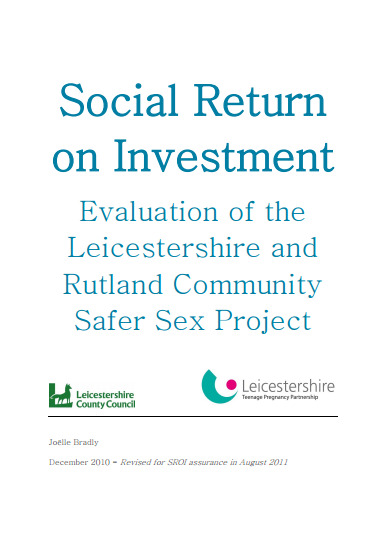Reports Database:
SROI Evaluation of the Leicestershire and Rutland Community Safer Sex Project

This report uses the Social Return on Investment (SROI) methodology to explore the value of the Community Safer Sex Project (CSSP) in terms of who is affected by the project and what changes for them. It brings together softer intelligence from those using the services with hard data on outcomes. The stakeholder consultations initially provide an understanding of what matters most to those affected. This then informs the process of identifying indicators and measuring outcomes to understand the social value that can be attributed to the project.
This SROI evaluation of the Leicestershire and Rutland Community Safer Sex Project (CSSP) found that, for each £1 invested in CSSP supporting Connexions Leicestershire to deliver sexual health services between approximately £7 and £9 is returned in social value. This is based on analysis of outcomes for young people visiting CSSP sites at Connexions between June 2009 and June 2010. Various sources of data were analysed to understand the nature and scale of need for the young people whom CSSP is designed to support. Examples of some of the findings were:
Approximately
- One in ten 14-16 year olds in Leicestershire have had unsafe sex
- One in ten females in the county become pregnant before they reach 20
- One in ten pregnancy tests taken at Connexions are positive
- One in ten young people with a negative test on their initial visit then go on to become pregnant within 12 months
Research also suggested that risks associated with becoming a teenage parent can have significant impacts on future outcomes, regardless of whether a birth occurs. Understanding more about young people’s attitudes to risk-taking has identified areas that are important to address such as supporting young people to make more informed choices, promoting healthy relationships and building confidence and autonomy.
The Leicestershire and Rutland Community Safe Sex Project (CSSP) supports the delivery of sexual health services for young people in community settings that they would typically access e.g. school, youth services, Connexions centres. Each year, approximately 500 staff working with young people are trained by CSSP. Sexual health services are then accessed through these sites by around 10,000 young people each year.By consulting with stakeholders, it was found that benefits of CSSP extended beyond contraception information and provision. Increased confidence in young people to engage with health services and improved emotional health, as a result of the one-to-one support, were felt to also be direct benefits of providing sexual health services for young people.The service was also found to contribute towards reducing risk-taking and increasing engagement for more vulnerable young people.
Analysis of the data suggests that females under-18 using Connexions for sexual health support were less likely to become pregnant a year after their first visit than would be expected if the service did not exist, although the difference was not large enough to be statistically significant. However, around 12% of females who initially used the service for a pregnancy test were estimated to then continue to use the service proactively for advice or contraception without any further pregnancy tests, or becoming pregnant, that year. Such changes in behaviour, as evidenced by case studies, can significantly benefit young people, their families and public services. This suggests that benefits of the service extend further than simply preventing pregnancies by also addressing the behaviours associated with becoming a teenage parent, such as lack of autonomy and risk-taking.
The SROI process identified that addressing these behaviours has a significant benefit to both young people and public services. However, it was also recognised that a number of different factors, outside the scope of CSSP, contribute to such risk-taking and a number of different agencies may need to be involved in supporting young people to feel more in control of their lives.
